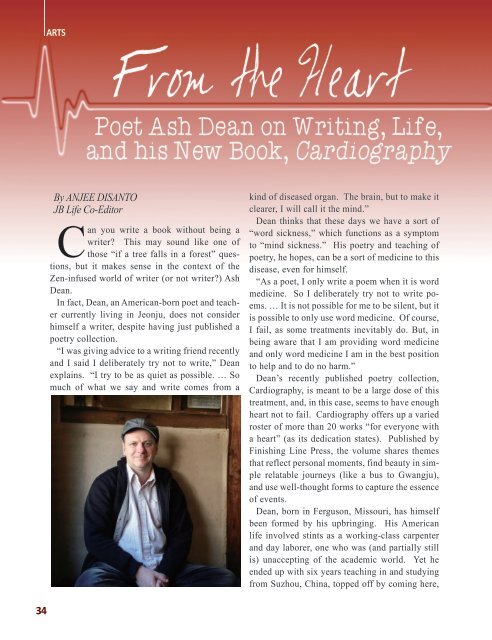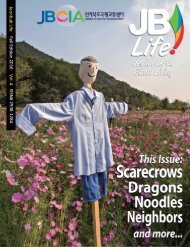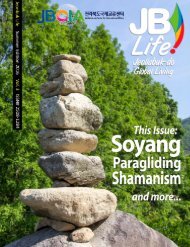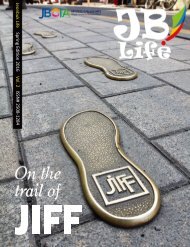JB Life March 2017
The Spring version of JB Life, North Jeolla's quarterly global lifestyle magazine.
The Spring version of JB Life, North Jeolla's quarterly global lifestyle magazine.
Create successful ePaper yourself
Turn your PDF publications into a flip-book with our unique Google optimized e-Paper software.
ARTS<br />
34<br />
By ANJEE DISANTO<br />
<strong>JB</strong> <strong>Life</strong> Co-Editor<br />
Can you write a book without being a<br />
writer? This may sound like one of<br />
those “if a tree falls in a forest” questions,<br />
but it makes sense in the context of the<br />
Zen-infused world of writer (or not writer?) Ash<br />
Dean.<br />
In fact, Dean, an American-born poet and teacher<br />
currently living in Jeonju, does not consider<br />
himself a writer, despite having just published a<br />
poetry collection.<br />
“I was giving advice to a writing friend recently<br />
and I said I deliberately try not to write,” Dean<br />
explains. “I try to be as quiet as possible. … So<br />
much of what we say and write comes from a<br />
kind of diseased organ. The brain, but to make it<br />
clearer, I will call it the mind.”<br />
Dean thinks that these days we have a sort of<br />
“word sickness,” which functions as a symptom<br />
to “mind sickness.” His poetry and teaching of<br />
poetry, he hopes, can be a sort of medicine to this<br />
disease, even for himself.<br />
“As a poet, I only write a poem when it is word<br />
medicine. So I deliberately try not to write poems.<br />
… It is not possible for me to be silent, but it<br />
is possible to only use word medicine. Of course,<br />
I fail, as some treatments inevitably do. But, in<br />
being aware that I am providing word medicine<br />
and only word medicine I am in the best position<br />
to help and to do no harm.”<br />
Dean’s recently published poetry collection,<br />
Cardiography, is meant to be a large dose of this<br />
treatment, and, in this case, seems to have enough<br />
heart not to fail. Cardiography offers up a varied<br />
roster of more than 20 works “for everyone with<br />
a heart” (as its dedication states). Published by<br />
Finishing Line Press, the volume shares themes<br />
that reflect personal moments, find beauty in simple<br />
relatable journeys (like a bus to Gwangju),<br />
and use well-thought forms to capture the essence<br />
of events.<br />
Dean, born in Ferguson, Missouri, has himself<br />
been formed by his upbringing. His American<br />
life involved stints as a working-class carpenter<br />
and day laborer, one who was (and partially still<br />
is) unaccepting of the academic world. Yet he<br />
ended up with six years teaching in and studying<br />
from Suzhou, China, topped off by coming here,<br />
to Korea, as a local literature teacher.<br />
About that anti-academic sentiment, Dean,<br />
though very much an artist at heart, still struggles<br />
with the concept of poetry being an academic<br />
or professional field – at least for himself<br />
personally. He received his MFA in Creative<br />
Writing from the International Writing Program<br />
at City University Hong Kong, but says he did<br />
so more to join a dialogue than to become a<br />
professional writer or an academic.<br />
“Not everything of value needs to be professionalized,”<br />
Dean explains. “I’ve always been<br />
uncomfortable with the idea that you professionalize<br />
joy, horror, sadness. This is the stuff<br />
of poetry.”<br />
His own book, he says, happened more organically<br />
than professionally. Many of the poems<br />
were collected during the time when his wife<br />
(a Gwangju native) was having open-heart surgery.<br />
This theme becomes evident in the reading<br />
of several of the compilation’s pieces. The<br />
transportation theme pops up periodically, too,<br />
reflecting the many journeys between cities in<br />
this time period. And the rest, with notes of<br />
spaces and events in China, Korea, and beyond,<br />
perhaps connects the dots between these and<br />
the writer’s own frame of mind.<br />
“Really what I’m doing is a record of my<br />
heart,” Dean says.<br />
As for the content, one of the points of distinction<br />
for Dean’s poetry is that it often embraces<br />
meaning through both its words and its<br />
physical shape. His forms are carefully contemplated.<br />
Each subconsciously directs the<br />
reader to envision or read in a certain manner.<br />
“Lag,” his book’s second selection, offers up<br />
lines split with uneven spacing between words,<br />
altering one’s internal reading as well as giving<br />
an intended aesthetic effect. The overall poem’s<br />
form represents an airplane’s cabin, with<br />
spaces for aisles and room between passengers.<br />
“This is an important part of the meditation<br />
that is taking place,” Dean explains, “and each<br />
line is part of the meditation because of the lim-<br />
g<br />
包<br />
four tiny<br />
incisions<br />
in the<br />
pericardium<br />
::<br />
a bento box<br />
prepared<br />
by mom<br />
at 4am<br />
::<br />
they never<br />
reveal everything<br />
about the contents<br />
of a dumpling<br />
::<br />
some things<br />
once open<br />
are more than<br />
we can say<br />
Jeonbuk <strong>Life</strong> 35







